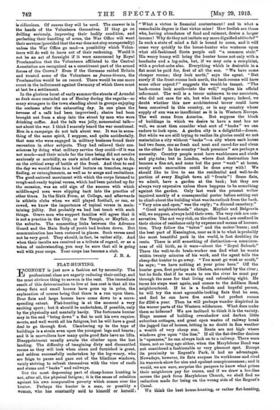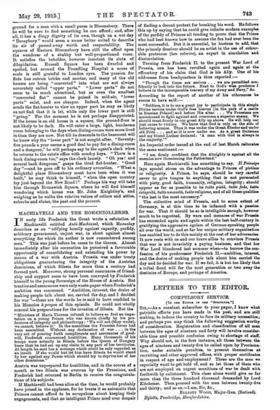FLAT-HUNTING.
ECONOMY is just now a fashion set by necessity. The professional class are eagerly reducing their outlay, and the most obvious thing to save on is the rent. The immediate result of this determination to live at less cost is that all the ebeap flats and small houses have gone up in price, the explanation of course being that there is a run upon them. Dear flats and large houses have come down to a corre- sponding extent. Flat-hunting is at the moment a very exciting sport ; but it should be undertaken, if possible, only by the physically and mentally hardy. The fortunate hunter may in the end "bring down" a flat to suit his own require- ments, and well worth all his fatigues, but he will have a good deal to go through first. Clambering up to the tope of buildings is a strain even upon the youngest legs and hearts ; and it is marvellous how many quite good fiats have no lifts. Disappointment usually awaits the climber upon the last landing. The difficulty of imagining dirty and dismantled rooms as they will look when clean and furnished is great, and seldom successfully undertaken by the leg-weary, who are feign to pause and gaze out of the blindlesa windows, vainly striving to refresh themselves with the view of roofs and slums and " backs " and railways.
But the moat depressing part of cheap-house hunting is not, after all, the physical fatigue; it is the sense of rebellion against his own comparative poverty which comes over the bunter. Perhaps the hunter is a man, or possibly a woman, who halt constantly said to himself or herself; "What a virtue is financial contentment! and in what a remarkable degree is that virtue mine! How foolish are those who, having abundance of food and raiment, desire a larger income ! Why do they not imitate my more dignified attitude P " In such a state of mind a fall is bound to come, and it will come very quickly to the house-hunter who ventures upon what old-fashioned Scots people call "a common stair." His weary tramp will bring the hunter home not only with a headache and a leg-ache, but, if we may coin a complaint, with a pocket-ache also. Everything which is desirable in a flat must bo paid for, first of all the sun. ' We have some cheaper rooms ; they look north," says the agent. "But surely if the front-rooms look north, the bath-rooms will have some other aspect ?" suggests the would-be tenant. "The back-rooms look south—into the well," replies his official informant. The well is a terror unknown to our ancestore, who did not care for air, but who liked space; indeed, we doubt whether this new architectural terror could have been conceived in this country, or in any country whose supply of sun was so insufficient as it is in Western Europe. The well came from America. But suppose the block of buildings in which we desire to have a nest has no well, we must then consider what sort of "backs" we can endure to look upon. A garden city is a delightful—dream. But while we are still trying to realize its glories could we not materialize a city without " backs "—a city where each house had two faces, one as fresh and neat and cared-for and clean as the other P In the country " back premises" are perhaps necessity. Country people must have washhouses and sheds and pig-tubs; but in London, where dust destruction has become a fine art, and none but the poor "wash" at home, surely such enormities could be done away with! We should like to live to see the residential and well-to-do portion of every English town all " fronts"1 Some flats, we admit, have a garden at the back; but they are always very expensive unless there happens to be something against the garden. Only last week the present writer inquired meekly of a consequential porter before setting out to climb about the building what was its outlook from the back. " Very nice and open," was the reply; "a disused cemetery."
"Good neighbourhoods" change. Mayfair and Belgravia will, we suppose, always hold their own. The very rich are con- servative. The not very rich, on the other hand, are confined in their choice of residence only by expense and means of locomo- tion. They follow the "tubes" and the motor-'buses; and the best part of Kensington, near as it is to what is probably the moot beautiful park in the world, is fast doubling its rents. There is still something of distinction—a conscious- ness of old birth, as it were—about the "Royal Suburb." There the well-to-do brain-worker can find what he wants within twenty minutes of his work, and the agent tells the cheap-flat bunter to go away. " Yon must go west or south," he says; "we have nothing at your price here." Off the hunter goes, first perhaps to Chelsea, attracted by the river ; but he finds that if he wants to see the river he must pay through the nose for that living and refreshing sight. He turns his steps west again, and comes to the Addison Road neighbourhood. If he is a foolish and hopeful person, he will try the most agreeable-looking fiats that he sees, and find he can have five small but perfect rooms for £280 a year. Then he will perhaps wander dispirited in the worser parts of the Western wilderness. What does make them so hideous P We are inclined to think it is the variety. Huge manses of building overshadow and darken little suburban cottages, and great open wastes of railway break the jagged line of houses, letting in no doubt in fine weather a wealth of very cheap sun. Rents are not high where windows give upon "the line." If all the flat-dweller desires is "openness," be can always look on to a railway. There were times, not so long ago either, when the Marylebone Road was not considered a fashionable or very pleasant spot. Except its proximity to Regent's Park, it had no advantages. Nowadays, however, its flats surpass its workhouse and rival its waxwork-show for size and opulent conspicuousness ; and it would, we are sure, surprise the paupers to know what prices their neighbours pay for rooms, and if we draw a bee-line across the park from Marylebone Church, we shall find no reduction made for being on the wrong side of the Regent's Canal.
We think the beet house-hunting, or rather flat-hunting, ground for a man with a small purse is Bloomsbury. There be will be sure to find something he can afford ; and, after all, it has a dingy dignity of its own, though on a wet day " Deeaybury" would seem a name better suited to describe its air of passed-away worth and respectability. The squares of Eastern Bloomsbury have still the effect upon the wanderer of a shabby but well-proportioned room. It satisfies the beholder, however insistent its state of dilapidation. Russell Square has been dwarfed and spoiled, but around the Foundling Hospital a sense of scale is still grateful to London eyes. The passion for flats has outrun bricks and mortar, and many of the old houses are being "converted" into what are not always accurately called "upper parts." "Lower parts" do not seem to be much advertised, but as even the smallest "converted flat" cannot be poised in mid-air, "lower parts" exist, and are cheaper. Indeed, when the agent sends the flat-hunter to view an upper part he may as likely as not find that it is let, while only the lower part is still "going." For the moment he is not perhaps disappointed. If the house is an old house in a square, the ground-floor is not likely to be dark. He will enter a large, light, handsome room belonging to the days when dining-rooms were more lived in than they are now. Not till he descends to the basement will he know why the "lower part" is not sought after. "Seventy. five pounds a year seems a good deal to pay for a dining-room and a dungeon," he will perhaps say to the agent's clerk when be returns to the estate office with sundry keys. " There is a back dining-room too," says the clerk lamely. "Oh yes I and several back dungeons," gasps the tired fiat-hunter. "Good day "—and he goes off to his ordinary avocation. "What a delightful place Bloomsbury must have been when it was built," he may think to himself, " when the open country lay just beyond the New Road I" Perhaps his way will take him through Brunswick Square, where he will find himself wondering which house was Mr. John Knightley's, and weighing as he walks the relative values of cellars and attics, subm ba and slums, the past and the present.



































 Previous page
Previous page